Strange Weather Read online
DEDICATION
For Mr. Blue Sky:
Aidan Sawyer King. Love you, kid.
Contents
Cover
Title Page
Dedication
Snapshot Chapter 1
Chapter 2
Chapter 3
Chapter 4
Chapter 5
Chapter 6
Chapter 7
Chapter 8
Chapter 9
Chapter 10
Chapter 11
Chapter 12
Chapter 13
Chapter 14
Chapter 15
Chapter 16
Chapter 17
Chapter 18
Chapter 19
Chapter 20
Chapter 21
Loaded October 14, 1993
September 2012–December 2012
April 12, 2013
July 1, 2013
July 6, 2013
July 8, 8:51 A.M.
July 9, 5:28 A.M.
July 10, 5:40 P.M.
July 11, 10:00 A.M.
July 12, 6:13 P.M.
July 13, 8:42 A.M.
Aloft Chapter 1
Chapter 2
Chapter 3
Chapter 4
Chapter 5
Chapter 6
Chapter 7
Chapter 8
Chapter 9
Chapter 10
Chapter 11
Chapter 12
Chapter 13
Chapter 14
Chapter 15
Chapter 16
Chapter 17
Chapter 18
Chapter 19
Chapter 20
Chapter 21
Chapter 22
Chapter 23
Chapter 24
Chapter 25
Rain
Afterword
About the Author
Also by Joe Hill
Copyright
About the Publisher
SNAPSHOT
1
SHELLY BEUKES STOOD AT THE bottom of the driveway, squinting up at our pink-sandstone ranch as if she had never seen it before. She wore a trench coat fit for Humphrey Bogart and carried a big cloth handbag printed with pineapples and tropical flowers. She could’ve been on her way to the supermarket, if there were one in walking distance, which there wasn’t. I had to look twice before I registered what was wrong with the picture: She had forgotten to put on her shoes, and her feet were filthy, almost black with grime.
I was in the garage, doing science—my father’s term for what I was up to anytime I decided to ruin a perfectly good vacuum cleaner or TV remote. I wrecked more than I built, although I had successfully wired an Atari joystick into a radio, so I could jump from station to station by pressing the Fire button—a fundamentally stupid trick that nevertheless impressed the judges of the eighth-grade science fair, where it earned me the blue ribbon for creativity.
On the morning Shelly turned up at the base of the driveway, I was working on my party gun. It looked like a death ray from a pulp-era science-fiction novel, a big horn of dented brass with the butt and trigger of a Luger (I had in fact soldered together a trumpet and a toy gun to create the body). When you pulled the trigger, though, it sounded an air horn, popped flashbulbs, and blew a storm of confetti and paper ribbons. I had an idea that if I could get the gun right, my dad and I could bring it to toy manufacturers, maybe license the idea to Spencer Gifts. Like most budding engineers, I honed my craft on a series of basically juvenile pranks. There isn’t a single dude at Google who didn’t at least fantasize about designing X-ray goggles to see through girls’ skirts.
I was aiming the barrel of the party gun into the street when I first spotted Shelly, right there in my sights. I put down my bozo blunderbuss and narrowed my eyes, looking her over. I could see her, but she couldn’t see me. For her, looking into the garage would’ve been like staring into the impenetrable darkness of an open mine shaft.
I was going to call to her, but then I saw her feet and the air snagged in my throat. I didn’t make a sound, just watched her for a bit. Her lips moved. She was whispering to herself.
She darted a look back the way she’d come, as if afraid someone might be sneaking up on her. But she was alone in the road, the world humid and still under the lid of an overcast sky. I remember that all the neighbors had put their garbage out and the trucks were late and the avenue stank.
Almost from the first, I felt it was important not to do anything to alarm her. There was no obvious reason for caution—but a lot of our best thinking takes place well below the level of conscious cogitation and has nothing to do with rationality. The monkey brain absorbs a great deal of information from subtle cues that we aren’t even aware we’ve received.
So when I came down the slope of the driveway, I had my thumbs hooked in my pockets and wasn’t even looking directly at her. I squinted into the horizon as if watching the flight of a far-off airplane. I approached her the way you’d close in on a limping stray dog, one that might lick your hand with hopeful affection or might lunge, upper lip drawn back to show a mouthful of teeth. I didn’t speak until I was almost within arm’s reach of her.
“Oh, hi, Mrs. Beukes,” I said, pretending to notice her for the first time. “You okay?”
Her head swung toward me, and her plump face instantly settled into a look of pleasant benignity. “Well, I’ve got myself all turned around! I walked all the way down here, but I don’t know why! This isn’t my day to clean!”
I hadn’t seen that one coming.
Once upon a time, Shelly had mopped and vacuumed and tidied the house, four hours every Tuesday and Friday afternoon. She was already old by then, although she had the brisk, muscular vigor of an Olympic curler. On Fridays she left us with a plate of cake-soft, date-filled cookies protected by a film of Saran Wrap. Man, those were some cookies. You can’t get anything like them anywhere anymore, and no crème brûlée at the Four Seasons ever tasted so good with a cup of tea.
But by August 1988 I was just weeks away from beginning high school, and it had been almost half my life since Shelly had cleaned for us on a regular basis. She’d stopped working for us after her triple bypass in 1982, when the doctor told her she ought to take some time to rest herself. She’d been resting ever since. I’d never given it much thought, but if I had, I might’ve wondered why she ever took the job in the first place. It wasn’t like she needed the money.
“Mrs. Beukes? Did my dad maybe ask you to come in and help out with Marie?”
Marie was the woman who’d replaced her, a sturdy, not terribly bright girl in her early twenties, with a big laugh and a heart-shaped can, who provided imagery for my nightly sausage-pounding ceremonies. I couldn’t imagine why my father might think Marie would need a hand. We weren’t, as far as I knew, anticipating company. I’m not sure we ever even had company.
Her smile faltered briefly. She shot one of those anxious looks back over her shoulder, down the road. When she returned her gaze to me, there was only the faintest trace of good humor on her face, and her eyes were frightened.
“I dunno, bucko—you tell me! Was I supposed to clean out the tub? I know I didn’t get to it last week, and it’s pretty dingy.” Shelly Beukes pawed through her cloth tote, muttering to herself. When she looked up, her lips were squeezed together in an expression of frustration. “Piss on it. I walked out of the house and forgot the fucking Ajax.”
I twitched, could not have been more startled if she’d pulled open that trench coat and revealed she was naked. Shelly Beukes wasn’t anyone’s idea of an uptight old lady—I had a memory of her cleaning our house in a John Belushi T-shirt—but I had never heard her use the word “fuck.” Even “piss on it” was quite a bit saltier than
her usual conversational fare.
Shelly didn’t notice my surprise, just went on to say, “Tell your dad I’ll take care of the tub tomorrow. I don’t need more than ten minutes to make it shine like no one ever put their ass in it.”
Her cloth shoulder bag drooped open. I looked into it and saw a battered, grimy lawn gnome, several empty soda cans, and a single raggedy old sneaker.
“I’d better go home,” she said suddenly, almost robotically. “The Afrikaner will be wondering where I got to.”
The Afrikaner was her husband, Lawrence Beukes, who had emigrated from Cape Town before I was born. At seventy, Larry Beukes was one of the most powerfully built men I knew, a former weight lifter with the sculpted arms and vein-threaded neck of a circus strongman. Being huge was his primary professional responsibility. He had made his money on a series of gyms he’d opened in the seventies, just as the oiled, mind-boggling mass of Arnold Schwarzenegger was muscling its way into the public consciousness. Larry and Arnie had once both appeared in the same calendar. Larry was February and flexed in the snow, wearing nothing but a tight black hammock for his nuts. Arnie was June and stood glistening on the beach, a girl in a bikini perched on each gargantuan arm.
Shelly darted a last look over her shoulder and then began to shuffle off, moving in a direction that would take her even farther from her house. The moment she looked away from me, she forgot me. I could see it in the way all expression dropped from her face. Her lips began to move as she whispered quiet questions to herself.
“Shelly! Hey, I was going to ask Mr. Beukes if . . . about . . .” I struggled to think of something Larry Beukes and I might have to discuss. “If he ever thought of hiring anyone to mow the lawn! He’s got better things to do, right? Mind if I walk to your house with you?” I reached for her elbow and caught her before she could drift out of reach.
She jerked at the sight of me—as if I had craftily snuck up on her—then gave me that brave, challenging smile. “I’ve told that old man we need to hire someone to cut the . . . the . . .” Her eyes dimmed. She couldn’t remember what needed cutting. At last she gave her head a little shake and went on: “ . . . the thing for I don’t know how long. Come on back with me. And you know what?” She clapped a hand over mine. “I think I’ve got some of those cookies you like!”
She winked, and for an instant I was sure she knew me and, more than that, knew herself. Shelly Beukes flickered into crisp focus, then went fuzzy again. I could see awareness slip away from her, a light on a dimmer switch being turned down to a dull glow.
So I walked her home. I felt bad about her bare feet on the hot road. It was muggy, and the mosquitoes were out. After a while I noticed a red flush across her face and a dew of sweat in her old-lady whiskers, and I thought maybe she should take the trench coat off. Although I admit that by then the notion had crossed my mind that maybe she really was naked under there. Given her disorientation, I didn’t think it could be ruled out. I fought down my unease and asked if I could carry her coat. She gave her head a quick shake.
“I don’t want to be recognized.”
This was such a wonderfully daffy thing to say that for a moment I forgot the situation and responded as if Shelly were still herself, a sensible person who loved Jeopardy! and cleaned ovens with an almost brutal determination.
“By who?” I asked.
She leaned toward me and in a voice that was practically a hiss said, “The Polaroid Man. That slick fucking weasel in his convertible. He’s been taking pictures when the Afrikaner isn’t around. I don’t know how much he’s taken away with his camera, but he can’t have any more.” She gripped my wrist. Her body was still stout and big-bosomed, but her hand was as bony and clawlike as a fairy-tale crone’s. “Don’t let him take a picture of you. Don’t let him start taking things away.”
“I’ll keep an eye out. Hey, really, Mrs. Beukes, you look like you’re melting in that coat. Let me have it and we’ll watch out for him together. You can jump into it again if you see him coming.”
She leaned her head back and narrowed her eyes, inspecting me the way she might’ve studied the small print at the bottom of a dubious contract. Finally she sniffed and shrugged out of the big coat and handed it to me. She was not naked underneath but wore a pair of black gym shorts and a T-shirt that was on inside out and backward, the tag flopping under her chin. Her legs were knotty and shockingly white, her calves crawling with varicose veins. I folded her coat, sweaty and wrinkled, over one arm, took her hand, and went on.
The roads in Golden Orchards, our little housing development north of Cupertino, were laid out like overlapping coils of rope, not a straight line in the whole thing. At first glance the houses appeared to be a scattershot mix of styles—a Spanish stucco here, a brick Colonial there. Spend enough time knocking around the neighborhood, though, and you came to recognize they were all the same house, more or less—same interior layout, same number of bathrooms, same-style windows—dressed up in different costumes.
The Beukes house was mock Victorian, but with some kind of beach theme going on: seashells embedded in the concrete path leading to the steps, a bleached starfish hung from the front door. Maybe Mr. Beukes’s gyms were called Neptune Fitness? Atlantis Athletics? Was it maybe a goof on the Nautilus machines that were used in the facilities? I don’t remember anymore. A lot of that day—August 15, 1988—is still sharp in my memory, but I’m not sure I was too clear on that particular detail even then.
I led her to the door and knocked, then rang the bell. I could’ve just let her in—it was her house, after all—but I didn’t think that suited the situation. I thought I ought to tell Larry Beukes where she had wandered and find some hopefully not-too-embarrassing way to let him know how confused she’d been.
Shelly gave no sign she recognized her own house. She stood at the bottom of the steps looking placidly around, waiting patiently. A few moments earlier, she’d seemed sly and even slightly threatening. Now she looked like a bored granny going door-to-door with her Boy Scout grandson, keeping him company while he sold magazine subscriptions.
Bumblebees burrowed into nodding white flowers. For the first time, it struck me that maybe Larry Beukes really did need to hire someone to cut his grass. The yard was unkempt and weedy, dandelions spotting the lawn. The house itself needed a power wash, had spots of mold high under the eaves. It had been a while since I’d walked by the place, and who knew when I had last really looked at it, not just let my gaze slide over it.
Larry Beukes had always maintained his property with the diligence and energy of a Prussian field marshal. He was out there twice a week in a muscle shirt, pushing a powerless hand mower, his delts tanned and rippling, his cleft chin lifted dramatically (he had great fuckin’ posture). Other lawns were green and tidy. His was meticulous.
Of course, I was only thirteen when all this happened, and I understand now what I didn’t at the time: It was all getting away from Lawrence Beukes. His ability to manage, to keep up with even the mild demands of suburban living, was being overwhelmed, a little at a time, as he wore down under the strain of looking after a woman who could no longer look after herself. I suppose it was only his inherent sense of optimism and conditioning—his sense of personal fitness, if you will—that allowed him to go on, kidding himself that he could handle it all.
I was beginning to think I might have to walk Shelly back to my house and wait with her there when Mr. Beukes’s ten-year-old burgundy Town Car swerved into the driveway. He was driving it like an outlaw on the run from Starsky and Hutch and bumped one tire up over the curb as he swung in. He got out in a sweat and almost stumbled and fell coming into the yard.
“Oh, Jesus, dere you are! I hoff been looging all over to hell and gone! You almost giff me a heart attack.” Larry’s accent just naturally made you think of apartheid, torture, and dictators sitting on gilt thrones in marble palaces with salamanders scampering along the walls. Which was too bad. He had made his money hauling around iron, not blood
diamonds. He had his flaws—he’d voted for Reagan, he believed that Carl Weathers was a great thespian, and he grew emotional listening to ABBA—but he revered and adored his wife, and balanced against that, his personal blemishes were no matter at all. He went on, “What did you do? I go next door to ask Mr. Bannerman if he hoff detergent, I come bagg, you are gone like a girl in a David Cobberfelt trick!”
He grabbed her in his arms, seemed like he might be about to give her a hard shake, then hugged her instead. He looked over her shoulder at me, his eyes glittering with tears.
“It’s okay, Mr. Beukes,” I said. “She’s fine. She was just kind of . . . lost.”
“I wasn’t lost,” she said, and she showed him a small, knowing smile. “I was hiding from the Polaroid Man.”
He shook his head. “Hush. Hush yourself, woman. Let’s ged you out of the sun and— Oh, Lord, your feet. I should make you take your feet off before you go inside. You will track your filth everywhere.”
All this sounds kind of savage and cruel, but his eyes were wet and he spoke with a gruff, wounded affection, talking to her the way you might speak to a beloved old cat that had gotten itself into a fight and come home missing an ear.
He marched her past me, up the brick steps, and into the house. I was about to go, thought I had already been forgotten, when he turned back to jab a trembling finger at my nose.
“I hoff something for you,” he said. “Do not float off, Michael Figlione.”
And he banged the door shut.
2
FROM A CERTAIN POINT OF view, his choice of words was almost funny. There was really no danger I was going to float off on him. We have not yet touched upon the elephant in the room, which is that at the age of thirteen I was the elephant in any room I stepped into. I was fat. Not “big-boned.” Not “sturdy.” Certainly not merely “husky.” When I walked across the kitchen, glasses rattled in the cupboard. When I stood among the other kids of my eighth-grade class, I looked like a buffalo wandering among the prairie dogs.

 The Fireman
The Fireman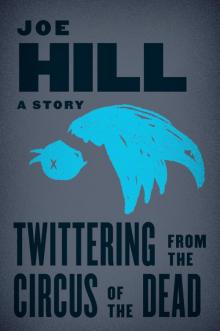 Twittering From the Circus of the Dead
Twittering From the Circus of the Dead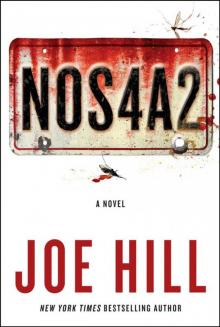 Nos4a2
Nos4a2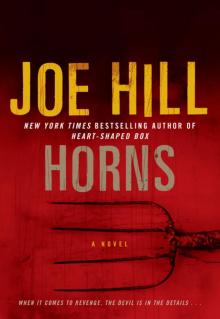 Horns
Horns Heart-Shaped Box
Heart-Shaped Box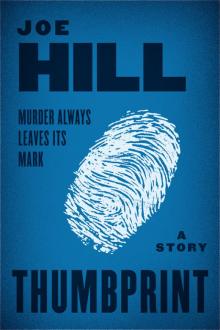 Thumbprint: A Story
Thumbprint: A Story Strange Weather
Strange Weather 20th Century Ghosts
20th Century Ghosts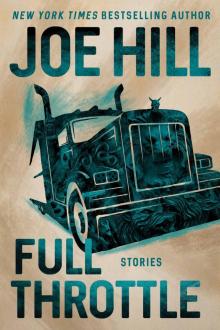 Full Throttle
Full Throttle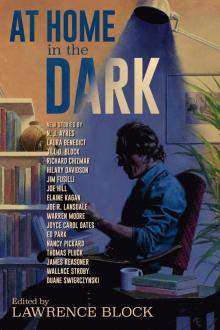 At Home in the Dark
At Home in the Dark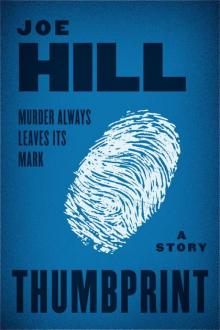 Thumbprint
Thumbprint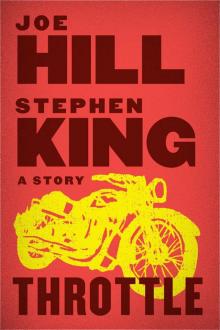 Throttle
Throttle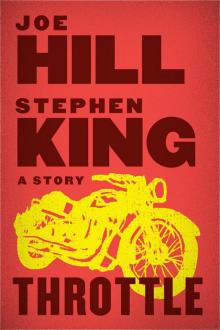 Throttle (Kindle Single)
Throttle (Kindle Single) The Best American Science Fiction and Fantasy 2015
The Best American Science Fiction and Fantasy 2015 Heart-Shaped Box with Bonus Material
Heart-Shaped Box with Bonus Material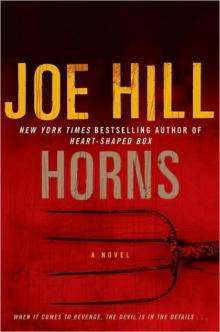 Horns: A Novel
Horns: A Novel